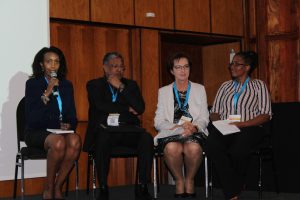
Pictured during the panel discussion from left: Dr Jane M Olwoch, SASSCAL Executive Director, Dr Gansen Pillay, DCEO NRF-RISA, Prof Stephanie Burton, Deputy Vice Principle Research University of Pretoria and Ms Mmampei Chaba, Chief Director Department of Science and Innovation.
SASSCAL Executive Director Dr Jane M Olwoch has been serving in the Future Earth Interim Steering Committee since February 2019. Future Earth held a panel discussion on 4 December during the Innovation Bridge Technology Showcasing and Matchmaking Event and Science Forum South Africa (IBSFSA) in Pretoria titled Towards the Future Earth Regional Office for Southern Africa (FEROSA): Harmonising the sustainability research landscape. The session facilitated discussions about climate change, biodiversity and technological innovation for economic development closer to society. By bringing the people at the forefront of policy formulation and implementation and academia to discuss the issues affecting society to date the event served as a platform that stimulated and encouraged an informative discussion with participants that is envisaged to input into the FEROSA strategic vision.
The panel discussion provided an ideal platform for consultation and synthesis with existing regional transformation and sustainability initiatives. The session also discussed and identified some mechanisms for bringing science closer to policy and society in the pursuit of socio-economic impact. Discussions were also based on identifying ways for integrating and harmonizing sustainability research and innovation activities, for achieving the developmental goals of the region and the continent. Panellists interrogated existing and new science to policy strategies that take into account the inter-linkages and inter-dependencies between science practitioners, users and policy makers.
During the discussion Dr Olwoch shared the role that SASSCAL can be support and inform for the Future Earth Initiative. Dr Olwoch identified various commonalities between the two institutions that include multinational presence and membership (regionality), institutional pillars of Research, Capacity Development and provision of services and products, funding mechanisms as well transdisciplinary and trans-sector approaches. Thus, through lessons learnt, SASSCAL is ideally placed and fits well with the FEROSA mandate.
Dr Olwoch also highlighted the need for a paradigm shift if we are to ensure that research informs policy and then society. There is also a need for coordinated approaches, co-production and establishment of partnerships to ensure attainment of both the SASSCAL and FEROSA mandate.
The panel concurred that political buy-in pivotal to the success of FEROSA. To ensure this buy in, there is need to demonstrate impact of activities to societies and the economy, coordinated implementation of activities, the need for more evidence to inform policy, strengthening of policy-science interface and urgent need to recognize that ‘the business as usual approach’ is not good or sustainable.




